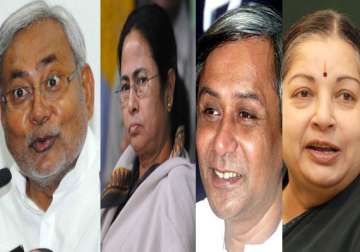Mamata, Non-Congress CMs Oppose NCTC, Centre Tries To Allay Fears
New Delhi, Feb 17: The plan for creation of the ambitious National Counter-Terrorism Centre (NCTC) has come under attack from non-Congress Chief Ministers, including ally Trinamool Congress, but the Centre rejected criticism that it would
New Delhi, Feb 17: The plan for creation of the ambitious National Counter-Terrorism Centre (NCTC) has come under attack from non-Congress Chief Ministers, including ally Trinamool Congress, but the Centre rejected criticism that it would infringe on the states' powers.
West Bengal Chief Minister Mamata Banerjee joined Odisha Chief Minister Naveen Patnaik in opposing the setting up of the anti-terror body and wrote a letter to Prime Minister Manmohan Singh asking him to “review and withdraw” the decision.
Expressing concern that the NCTC would infringe on the federal rights of states, Banerjee had said: “It is difficult for the state government to accept such arbitrary exercise of power by the central government/central agency, which have a bearing on the rights and privilege of the states as enshrined in the Constitution of India”.
Banerjee's letter was released by Patnaik's office in Bhubaneswar. Patnaik himself slammed the creation of the counter-terror body saying the UPA government is issuing “authoritarian orders” without consulting the states.
Patnaik, earlier this week, had written to non-Congress Chief Ministers and leaders including J Jayalalitha (Tamil Nadu), Nitish Kumar (Bihar) and TDP chief and former Andhra Pradesh Chief Minister N Chandrababu Naidu against the Centre's move.
“My concern is the authoritarian notification with draconian overtones about law and order among others in which the state governments have not been consulted,” Patnaik said.
Reacting to the criticism, Union Home Secretary R K Singh said the NCTC is in national interest and there was no need to consult the states prior to notification of the NCTC as it was being established under the existing laws.
The Union Home Secretary said there was no need to consult states prior to notifying the NCTC as it has been formed under the existing Unlawful Activities (Prevention) Act which has been in force for several years under which the security agencies were operating.
“NCTC is being formed for better coordination among agencies to fight terror better. We are not passing any new legislation. The sections which have been quoted have been on the statute for the past six seven years. It is not any new provisions of law or anything like that. That Act has been on the statute book for many years. There should not be any controversy,” he said.
Government sources here said the Union Home Secretary had called up West Bengal Chief Secretary a few days ago to explain to him that Centre's police powers under the NCTC would only be terror-related as under the provisions of the Unlawful Activities Prevention Act (UAPA) and hence will not infringe on the powers of the states.
In her letter to the Prime Minister, Banerjee said “The order, therefore, appears to be an infringement on the powers of state governments in matters of investigation and maintenance of order”.
Under this order issued, Banerjee said, extensive powers have been given to the NCTC located in the Intelligence Bureau (IB), and added that officers of the Operations Division of the NCTC will have the power to arrest and the powers to search under section 4 3-A of the Unlawful Activities (Prevention) Act, 1967.
Also all authorities including the functionaries of the state governments are required to provide information/ documents to the NCTC, Banerjee said.
In his letter to the Prime Minister, the Odisha Chief Minister opposed the powers given to the newly constituted NCTC.
“I have written a strongly worded letter to the Prime Minister opposing the powers given to the NCTC,” Patnaik said. Patnaik had also described the the notification issued by the Homer Ministry as “draconian.”
TDP chief N Chandrababu Naidu also said he had written a letter to the Prime Minister protesting the Centre's move to set up the NCTC.
“It is very unfortunate. Ours is a federal structure. Without consulting political parties, state governments and without debate in Parliament, unilaterally they have taken a decision. This is not good. It is a set back for federalism,” he said.
Gujarat Chief Minister Narendra Modi also joined the chorus opposing the Centre's order on National Counter Terrorism Centre (NCTC), saying it was an attempt to snatch the powers of the states and asked the Prime Minister to immediately withdraw it.
“The National Counter Terrorism Centre (NCTC) order by the central government is totally against the federal structure of the country,” Modi wrote in a letter to Prime Minister Manmohan Singh.
He claimed that states were not consulted over the issue.
“For fighting terrorism and Naxalism, the Centre instead of consulting the states, with this order is trying to snatch their powers granted by the Constitution. This notification should be immediately withdrawn,” he wrote.
Modi's letter comes in the wake of opposition to NCTC by Chief Ministers of several states like Odhisa, West Bengal, Bihar, Madhya Pradesh and Tamil Nadu, who have claimed that it will infringe on the rights of the states on issues of law and order.
The Gujarat Chief Minister, in his letter, highlighted several points which he felt were against the federal structure of the state.
“Under the Constitution, law and order has been put under the state subject. However, the February 3 office memorandum of the Central Home Ministry has put all the intelligence agencies under NCTC. As per this notification, all intelligence agencies of the state as well as central agencies and India's external agencies will have to work under the NCTC,” he said in the letter.
